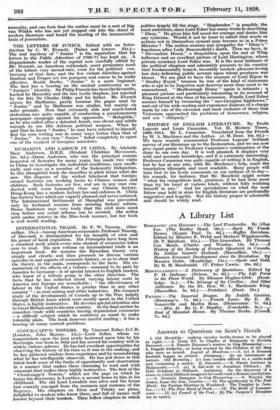THE LETTERS OF JUNIUS. Edited with an Intro- duction by
C. W. Everett. (Faber and Gwyer. 21s.)- The real mystery of " Junius " is the reputation that his letters in the Pub& Advertiser of 1769-71 has kept up. A dispassionate reader of the reprint now carefully edited by Mr. Everett, an American enthusiast, must pronounce most of the letters very second-rate, even for the political con- .troversy of that date, and the few violent diatribes against Grafton and Draper are too pompous and coarse to be really effective. Beside Burke, , Junius ' is a mere beginner. The fact has a bearing on the ancient controversy as to " Junius's " identity. Sir Philip Francis has been the favourite, backed by Macaulay and the late Leslie Stephen, but rejected by the late Sir Charles Dilke and his father. Mr. Everett argues for Shelburne, partly because the paper used by " Junius " and by Shelburne was similar, but mainly on safer grounds. Now that extremely able and much-hated statesman was quite capable of conducting a pseudonymous newspaper campaign against his opponents. ` Malagrida," as he was called after a detested Jesuit, was clever and subtle enough to use this dubious political weapon. When he said that he knew " Junius," he may have referred to himself. But his own writing was in many ways better than that of " Junius." In any case " Junius ' failed completely to upset one of the weakest of Georgian ministries.






































 Previous page
Previous page